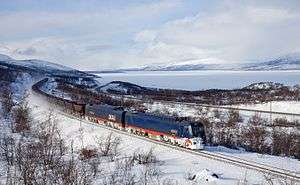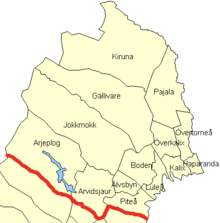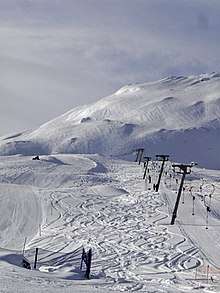Norrbotten County
Norrbotten County, Norrbottens län, is the northernmost part of Norrland, Sweden.
Bordering to Norway and Finland it covers 100 000 square kilometres (nearly a quarter of Sweden's total area and larger than countries such as Hungary and Portugal), from the tall mountains in the west, to the coast and archipelagoes in the east. It includes the province of Norrbotten and the northern part of the province of Lappland. Much of Norrbotten Country is within the Arctic Circle, meaning that Midnight Sun and Arctic Night occur.
The county has a mere 250,000 inhabitants (2.5% of the national population), most of them in Luleå, Piteå, Boden, and Kiruna.

Municipalities

Norrbotten proper
Tornedalen
Tornedalen, the valley of Torne River, is home to a Finno-Ugric community with Meänkieli as their mother tongue.
Northern Lappland
- Kiruna Municipality, the country's largest by area, contains settlements such as Jukkasjärvi, Abisko, Karesuando and Riksgränsen, as well as Kiruna itself.
- Gällivare, a mining town
- Jokkmokk
- Arjeplog
- Arvidsjaur
Other destinations
- 🌍 Jukkasjärvi , with the Ice Hotel
- 🌍 Kebnekaise and Nikkaluokta , Swedens tallest mountain
- 🌍 Laponia , four national parks, and the largest wilderness in Europe
- 🌍 Abisko , a national park
- 🌍 Riksgränsen , a ski resort
Understand
Lappland is the homeland of the Sami culture since the Ice Age. While Swedish settlers arrived to the coast in the 14th century, and Sweden claimed the land in the 16th century, the communities remained isolated, speaking either Sami, Meänkieli, or bondska, a Nordic dialect group very different from standard Swedish.
The demand for iron and wood induced a wave of colonization in the late 19th century with enormous investment in railways, mines and hydroelectric plants, which are today indispensable to the Swedish economy. In the late 20th century, the industries were automated, and the countryside was again depopulated, though tourism and space science have emerged as new businesses.
Seasonal variations of temperature and daylight are dramatic, and the Midnight Sun can be seen in much of the country. See winter in the Nordic countries.
Talk
Though Swedish is the everyday language, and English is well understood, the northern edge of Sweden is linguistically diverse. The Sami languages, as well as the Meänkieli at the Torne river, are Finno-Ugric; similar to the Finnish language, the latter mutually intelligible. Some of the most archaic Swedish dialects, collectively described as bondska, have survived in towns such as Överkalix.
Get in
Resrobot is a search engine for all public transport in Sweden.
By plane
Domestic airports are located at Arvidsjaur, Luleå, Gällivare, Kiruna, and Pajala. Most planes arrive from Stockholm-Arlanda airport (ARN IATA).
By train
- SJ has sleeper trains from Stockholm and Gothenburg to Luleå and Kiruna.
By car
- From south Sweden to Kiruna or Gällivare: E4 and E10. For Pajala use road 392.
- From south Sweden to Arvidsjaur: E4 until Skellefteå and then road 95.
Get around
By plane
- There are flights Luleå-Kiruna and Luleå-Pajala.
By train
- SJ has trains Luleå-Gällivare-Kiruna. This Malmbanan rail line carries iron ore from the mines in Kiruna and Gällivare to the ports of Narvik and Luleå, and is regarded to be Sweden's most scenic railway.
By bus
- Länstrafiken i Norrbotten has local and regional buses.
See
Arctic Sweden contains enormous areas of pristine nature. The Northern Lights can be seen during favourable conditions.
Do

As Sweden's northernmost county, with the tallest mountains, winter sport and hiking is popular.
Riksgränsen is Sweden's northernmost ski resort, with snow well into June.
Itineraries
- Hiking along Kungsleden, Padjelantaleden or Nordkalottleden
Eat
- See also: Nordic cuisine
- Kalix löjrom.
- Reindeer
- Surströmming (fermented herring); see Nordic cuisine#Ingredients.
- Palt
Drink
Nightlife is limited to the cities and the resorts.
Stay safe
See cold weather and winter driving.
Go next